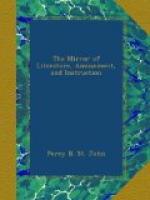His lodgings, which were in the Palais Royal, above the Cafe Phoenix, were particularly filthy; his bedroom, into which all visiters were shown, was truly disgusting; though he had at the same time two sitting-rooms, handsomely furnished, which were constantly locked, and into which he himself perhaps did not enter once in a month. An anecdote, which he related to me, will tend to illustrate his character and style of living. A pair of his pantaloons became much worn in the pockets, and he took them to a tailor to be repaired. They were brought home when he was absent, and left below with the porter, who gave them to him on his return. The following morning the tailleur called while Colton was still in bed, for the cash; he was shown into the bedroom by the miserable little urchin who attended daily to light the fire, &c., and demanded in payment twenty sous; this was resisted on the part of Colton as exorbitant, and the tailleur, vexed at having parted with his work before payment, seized a pair that were at the bedside, (imagining them the same that he had stitched,) and was about to quit the room with them as security, when the reverend gentleman, drawing a pistol from under his pillow, and presenting it at the terrified mender of garments, swore he would favour him with the contents unless the pantaloons were replaced: this was of course complied with, and our indignant tailleur immediately proceeded to Monsieur le Commissaire, who dispatched messengers to require the attendance of the party who had thus threatened the life of a Citizen of Paris. Colton then explained that the pantaloons of which the plaintiff had taken possession, were those he had worn on the preceding day, and contained cash that he had brought from the gaming-house to the amount of nearly L2,000. He was of course discharged on payment of the twenty sous to the tailor.
Although generally considered mean, I have much pleasure in stating that I have known him perform many acts of charity, frequently giving a dinner to some one of his reduced countrymen, (of whom there are too many in Paris,) and occasionally assisting them with small sums of money. It has been stated that the dread of an operation which became necessary for a complaint under which he laboured, was the cause of his suicide; this I much doubt, since I have never met with a man of greater fortitude and stronger nerve. I am rather disposed to think that the depressed state of his finances, severing the only hold he had on his dissolute associates, and the attention paid too often to wealth, though accompanied by vice, having disappeared, he found himself pennyless and despised; he was without religious consolation; his health declined, his spirits were broken; he was, and felt himself, alone in the world, without friends and without commiseration, and in a moment of desperation he put a period to his reckless existence.




